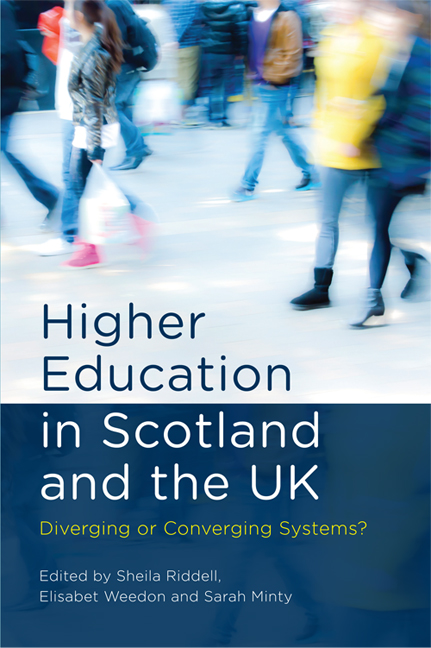Book contents
- Frontmatter
- Contents
- Figures
- Tables
- Acknowledgement
- The Contributors
- Dedication
- 1 Scottish Higher Education and Devolution
- 2 Higher Education Governance and Institutional Autonomy in the Post-devolution UK
- 3 Student Funding in the UK: Post-Devolution Scotland in a UK Context
- 4 Young People–s Attitudes towards Student Debt in Scotland and England
- 5 Cross-border Flows of Students within the UK
- 6 Widening Access to Higher Education in Scotland, the UK and Europe
- 7 The Internationalisation of Higher Education in Scotland and the UK
- 8 Research Policy in Scotland and the Rest of the UK
- 9 Devolution and Higher Education Policy: Negotiating UK and International Boundaries
- Appendix 1 Research Methods
- Appendix 2 List of Acronyms
- Index
7 - The Internationalisation of Higher Education in Scotland and the UK
Published online by Cambridge University Press: 05 August 2016
- Frontmatter
- Contents
- Figures
- Tables
- Acknowledgement
- The Contributors
- Dedication
- 1 Scottish Higher Education and Devolution
- 2 Higher Education Governance and Institutional Autonomy in the Post-devolution UK
- 3 Student Funding in the UK: Post-Devolution Scotland in a UK Context
- 4 Young People–s Attitudes towards Student Debt in Scotland and England
- 5 Cross-border Flows of Students within the UK
- 6 Widening Access to Higher Education in Scotland, the UK and Europe
- 7 The Internationalisation of Higher Education in Scotland and the UK
- 8 Research Policy in Scotland and the Rest of the UK
- 9 Devolution and Higher Education Policy: Negotiating UK and International Boundaries
- Appendix 1 Research Methods
- Appendix 2 List of Acronyms
- Index
Summary
INTRODUCTION
Globally over the last forty years the number of students who leave their home country to study abroad has grown considerably. According to the Organisation for Economic Co-operation and Development (OECD), in 1975, 0.8 million students moved abroad to study; by 2012, this number had grown to 4.5 million (OECD, 2014). The reasons for migrating to study are often described in terms of ‘push’ factors relating to poorer higher education opportunities in the student's home country, and ‘pull’ factors, relating to attractive features of provision in the host country (Altbach, 2004). Traditionally, countries in the English-speaking world, such as the UK, USA and Australia, have been major recipients of international students, but these countries are now facing increasing competition, as universities vie for advantage in a global higher education market (Marginson, 2008; de Wit et al., 2013). International students are considered valuable not only to the host country, but also to individual universities since they boost institutional finance as well as generating jobs in the local economy and creating a more diverse local culture.
Using data from the Higher Education Statistics Agency (HESA) as well as key informant interviews, this chapter examines the relative importance of international students in the four countries of the UK. The issue of migrant students has become intertwined with the hot political topic of immigration more generally, and we examine how this has played out in different contexts. Finally, we present a case study of Chinese students studying mainly at an ancient Scottish university to shed light on their reasons for enrolling at this institution and their experiences of living and studying in Scotland. Gallacher and Raffe (2012) suggested that the internationalisation of higher education was an area of policy convergence across the UK, and in the conclusion we explore the extent to which this is still the case. It should be noted that throughout this chapter the term ‘international student’ or ‘overseas student’ is used to refer to a non-EU student, since those from the EU study under the same terms and conditions as home students.
- Type
- Chapter
- Information
- Higher Education in Scotland and the UKDiverging or Converging Systems?, pp. 110 - 127Publisher: Edinburgh University PressPrint publication year: 2015

